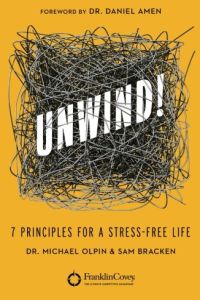Join getAbstract to access the summary!

Join getAbstract to access the summary!
Michael Olpin and Sam Bracken
Unwind!
7 Principles for a Stress-Free Life
Grand Harbor Press, 2014
What's inside?
“Unwind” your stress by taking charge of your response to it.
Recommendation
Stephen R. Covey’s influential business book, The 7 Habits of Highly Effective People, inspired this stress-management manual. Health management professor Dr. Michael Olpin and his former patient Sam Bracken, who overcame childhood abuse and homelessness, show you how to change your reactions to stress. They teach that most stress comes from within, which means you can learn to “unwind” your stress and take charge of your response to it. They discuss seven paradigms you can change to control stress in your life. Each chapter includes sidebars and questionnaires to help you identify and work on your dominant paradigm. The last chapter lists specific techniques for managing mental, physical, emotional and spiritual stressors. getAbstract recommends this short, insightful guide to anyone seeking more peace of mind.
Summary
About the Authors
Dr. Michael Olpin founded and leads the Stress Relief Center at Weber State University where he teaches health management. Sam Bracken, who wrote My Orange Duffel Bag: A Journey to Radical Change, co-founded the nonprofit Orange Duffel Bag Foundation to help at-risk youth.
















Comment on this summary